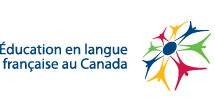FAQ
Just enter your postal code into the search engine on the FLE Canada website to find the day care facility or school nearest your home. To search by location, enter your city or town.
The experience provided by French-language schools is very different from the experience provided by French immersion programs in English-language schools.
- In a French-language school, the learner is in an environment where French is the primary language. In an immersion program, the learner is exposed to French as a second language.
- In a French-language school, all subjects are taught in French except English, which is taught with the same curriculum as in English-speaking schools. In the immersion program, French is taught as a second language, and some subjects are taught in French.
Public education is provided free to all Canadians who meet a number of age and residence requirements.
In Canada, there is no federal department of education and no integrated national system of education. Within the federal system of shared powers, Canada’s Constitution Act of 1867 provides that “[I]n and for each province, the legislature may exclusively make Laws in relation to Education.”
Each province and territory has one or two government departments or ministries that are responsible for education, headed by a minister who is almost always an elected member of the Legislative Assembly and appointed to the position by the government leader of the province or territory. Deputy ministers, who belong to the civil service, are responsible for the operation of the departments. Ministries and departments provide educational, administrative, financial management and school support functions, and define both the educational services to be provided and the policy and legislative frameworks underpinning them.
Elementary and secondary education is managed locally by school boards, school districts, school divisions, and district education councils. Their members are elected by public ballot. The power delegated to the local authorities is at the discretion of the provincial and territorial governments and generally consists of the operation and administration – including financial administration – of the group of schools within their board or division, curriculum implementation, responsibility for personnel, enrolment of students, and initiation of proposals for new construction or other major capital expenditures. (Source: Council of Ministers of Education, Canada)




